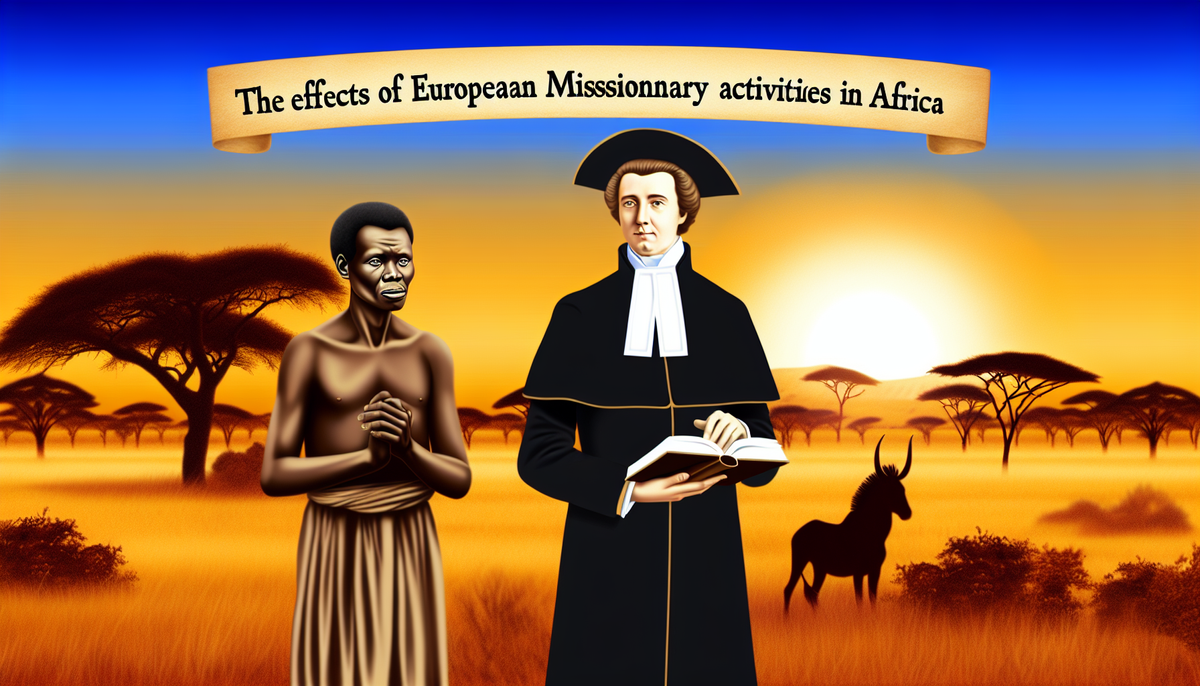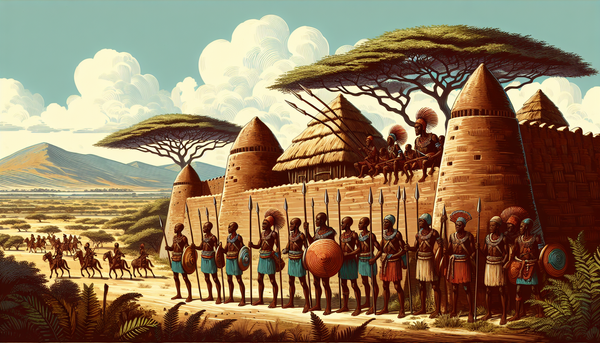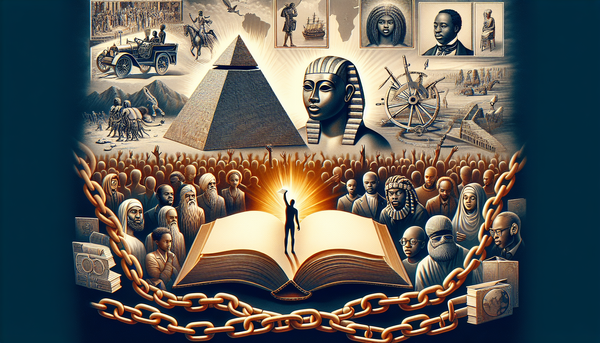The Effects of European Missionary Activities in Africa

Europeans began evangelizing Africa in the late 15th century through the Age of Exploration, with a primary focus on spreading Christianity and converting indigenous populations to the faith. This process was often intertwined with colonial expansion and the imposition of European cultural norms on African societies. Missionaries played a significant role in establishing schools, hospitals, and churches across the continent, aiming to educate and provide healthcare alongside their evangelical efforts. The arrival of missionaries led to a complex blend of religious, social, and economic changes in African communities, shaping the continent's modern landscape. The European evangelization in Africa had profound and lasting effects on the region, influencing everything from spiritual beliefs to political structures. This introduction sets the stage for a deeper exploration of the impacts of missionary activities and their ongoing legacy in Africa.
The exploration of Africa by European missionaries began in the late 15th century during the Age of Discovery. Initially driven by a desire to expand trade routes and establish colonial territories, European explorers made initial contact with African communities along the coastlines. These encounters marked the beginning of a complex relationship between Europeans and Africans, characterized by cultural exchange, trade, and later, missionary activities. The exploration phase was fueled by a combination of curiosity, economic interests, and a desire to spread Christianity to new lands. As European ships navigated the African coast, they established trading posts and formed partnerships with local rulers, paving the way for further interactions between the two continents. The exploration and initial contacts between Europeans and Africans set the stage for the subsequent influx of missionaries and the broader impact of European influence on the continent.
Education initiatives and cultural exchanges were key components of European missionary activities in Africa. Missionaries recognized the importance of education in their efforts to spread Christianity and often established schools and training programs for local populations. These educational initiatives introduced Western knowledge and values to African communities, alongside religious teachings. The missionaries also facilitated cultural exchanges by sharing European customs, languages, and traditions with the indigenous people, while simultaneously learning from the local cultures they encountered. This exchange of ideas and practices led to a blending of cultures, influencing everything from language and dress to social customs and religious beliefs. Through education and cultural exchanges, missionaries sought to not only convert Africans to Christianity but also to instill Western values and norms in the communities they served. These initiatives had a lasting impact on African societies, shaping their identities and contributing to the broader cultural diversity of the continent.
The healthcare enhancements facilitated by European missionaries in Africa played a significant role in improving the well-being of local communities. Missionaries identified access to healthcare as a critical need in many African regions and established hospitals, clinics, and medical missions to address these challenges. Drawing on their knowledge of Western medicine, missionaries introduced new healthcare practices, treatments, and technologies to African populations, contributing to advancements in public health and disease prevention. They also trained local individuals as nurses, doctors, and healthcare workers, empowering communities to take charge of their own health. Through their medical efforts, missionaries not only provided essential care to those in need but also worked to combat widespread diseases and improve overall living conditions. The healthcare enhancements brought about by missionary work had a lasting impact on African healthcare systems, laying the groundwork for future medical advancements and contributing to the overall well-being of the communities they served. This focus on healthcare exemplified the missionary commitment to holistic transformation and improving the quality of life for all.
The religious conversions facilitated by European missionaries in Africa had profound social implications, reshaping the spiritual and cultural landscape of the continent. Missionaries actively sought to convert indigenous populations to Christianity, viewing religious transformation as a central aspect of their mission. As Africans embraced Christianity, their traditional beliefs and practices often underwent significant changes, leading to shifts in social structures, values, and identities within local communities. Religious conversions sparked debates and conflicts within societies as individuals navigated the complexities of blending their ancestral traditions with the new faith introduced by missionaries.
Moreover, the spread of Christianity through missionary efforts also influenced power dynamics and hierarchies within African societies, as converted individuals often gained access to education, leadership roles, and economic opportunities provided by missionary organizations. These social changes had far-reaching effects on family structures, gender roles, and community interactions, shaping a new social order that reflected a fusion of African and European values. The religious conversions prompted by European missionaries in Africa thus created a cultural fusion that continues to shape the social fabric of the continent to this day.
The economic changes induced by missionary influence in Africa were far-reaching and multifaceted. European missionaries often established trade networks, agricultural projects, and vocational training programs in the communities they served, aiming to uplift local economies and provide sustainable livelihoods for indigenous populations. By introducing new farming techniques, crops, and artisanal skills, missionaries helped improve agricultural production and promoted economic self-sufficiency among African communities. Additionally, missionary-run businesses, such as shops and factories, provided employment opportunities and contributed to the development of local economies.
Furthermore, the establishment of schools and educational initiatives by missionaries enabled Africans to acquire new skills and knowledge that were essential for participating in the evolving economic landscape. As converted individuals gained access to education and vocational training, they were better equipped to engage in commercial activities, trade with European settlers, and participate in the emerging market economy. Missionary influence also played a role in shaping labor relations and business practices in African societies, influencing patterns of commerce and entrepreneurship. Overall, the economic changes induced by missionary activities in Africa had a lasting impact on the prosperity and economic development of the continent.
The legacy of missionary presence in modern Africa continues to be deeply woven into the social, cultural, and economic fabric of the continent. The efforts of European missionaries to spread Christianity, provide education, healthcare, and foster economic development have left a lasting impact that is still visible today. Many of the schools, hospitals, and churches established by missionaries remain vital institutions in many African communities, providing essential services and resources to the local populations.
The missionary influence on education has contributed to the development of a literate and skilled workforce in Africa, powering economic growth and innovation in various sectors. Additionally, the healthcare enhancements brought about by missionaries have had a significant impact on improving public health and reducing the burden of disease in many regions. The blending of Western and African cultures through cultural exchanges facilitated by missionaries has enriched the cultural diversity of Africa and shaped its unique identity.
Despite some contentious aspects of missionary history, their legacy in modern Africa is one of resilience, adaptation, and positive transformation. The values of compassion, service, and social justice promoted by missionaries continue to inspire individuals and communities to work towards a better future for all in Africa.



